Autumn Gear Guide
Find inspiration in our Gear Guide that will keep you out on your bike through wind or rain.
Download NowOlatunji Oboi Reed and Jamal Julien are transforming lives and communities through social bike rides in Chicago, IL.
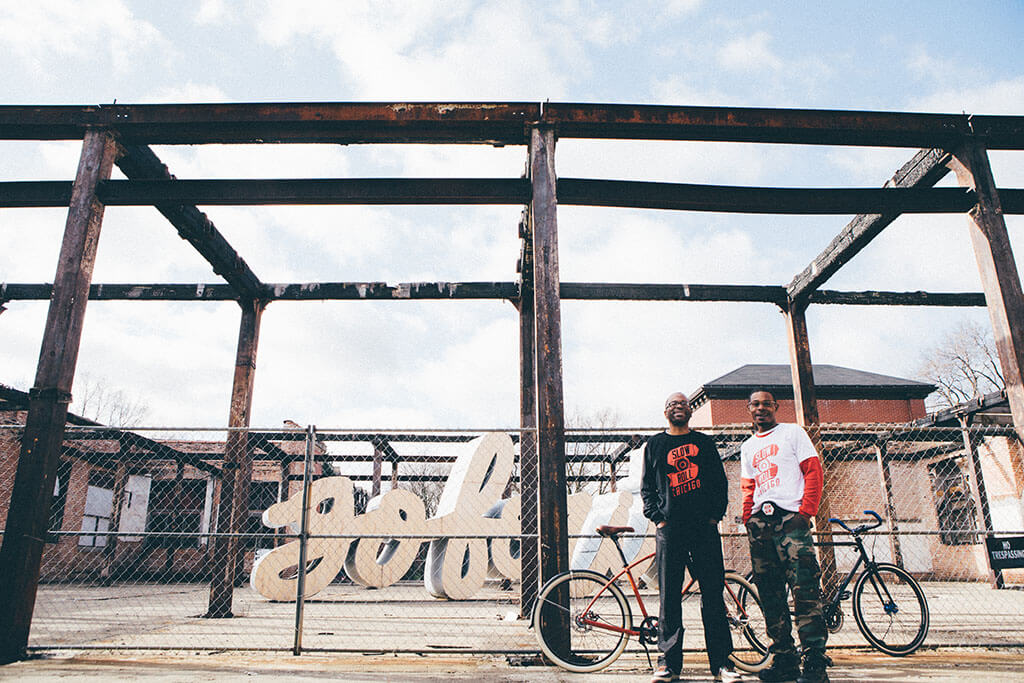
Photo by Lisa Beth Anderson
Olatunji Oboi Reed and Jamal Julien have known each other since the fourth grade. The two boys grew up on the South Side of Chicago, IL, and would walk to school together every morning. In the evenings, they would often ride their bikes to the park or around the neighborhood. Their friendship developed as they explored their neighborhood on foot and on bikes.
But their carefree days of cruising around the neighborhood ground to a complete halt after childhood. Fastforward thirty years and Reed and Julien, now in their forties, are riding their bikes around the South Side together again – for entirely different reasons.
“For a lot of people of color in Chicago and a lot of low-moderate income people, bikes are perceived as something white people do, children do, something poor people do because they can’t afford a car, or something fitness fanatics do,” explained Reed. “And I just didn’t want to be perceived in that way, so I just never even considered riding a bike. Until about 10 years ago.”
Reed, who has struggled with depression since high school, experienced circumstances that triggered a particularly severe bout of the illness. He took a leave from work, holed himself up in his home, and cut off contact with most of the people close to him. Then in what felt like a last-ditch effort to find some stability, he dusted off an old bicycle in the basement, worked up the energy to get it fixed, and took it to the lakefront for a ride.
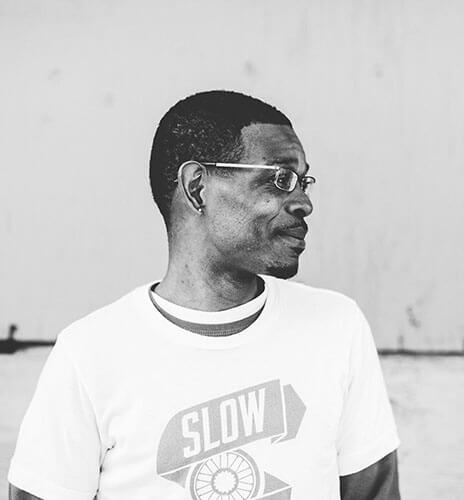
Jamal Julien. Photo by Lisa Beth Anderson
“I’m still incredibly depressed, still in this mental fog, and still deeply interested in just being alone, so I’m approaching this whole thing with a lot of trepidation,” said Reed. “I hop on the bike, and I start riding. I start looking around, and it’s like a painting, the water is crashing along the shore, the blue sky, the sun is peeking out of the clouds … it’s just this incredible natural experience that I’m having in the midst of this painful depression, and it’s just beautiful.”
Reed recalled seeing a number of other riders on the lakefront that day and feeling, for the first time in months, an urge to connect with other people. “I would look at somebody and give a head nod and they would give a head nod back. Or I would say ‘What’s up brother?’ and they would say ‘What’s up.’” Reed described that ride – the ability to connect even briefly with strangers, the natural beauty of the lakefront, and a welcome simplicity in the physical rotation of the pedals – as a thoroughly transformative experience that in many ways saved his life. “For me, a lot of why I’m still here today is that one bike ride that I did that Saturday morning on 63rd Street and Beach.”
Julien, meanwhile, hopped on his bike again for a different reason. At the age of 18, his first child was born. Just out of high school and already a father, he had to dramatically realign the way he managed his time and hobbies. “It was tough for me,” he said. “I was a young parent, I had a daughter, and I didn’t know what the hell I was doing.” Recalling his own childhood memories of riding a bike around the neighborhood, he figured biking would be the perfect opportunity to connect with his daughter.
“I got the little seat for kids, you know, and I’d just toodle around and ride around with her, we’d go get coffee in the morning,” recalled Julien “And then I taught her how to ride a bike. I had such a wonderful experience biking myself, I thought that this would be something that she would enjoy and something that we could do together.” Julien has since taught each of his children to ride and even now still takes regular bike rides as a way to spend quality time with his kids.
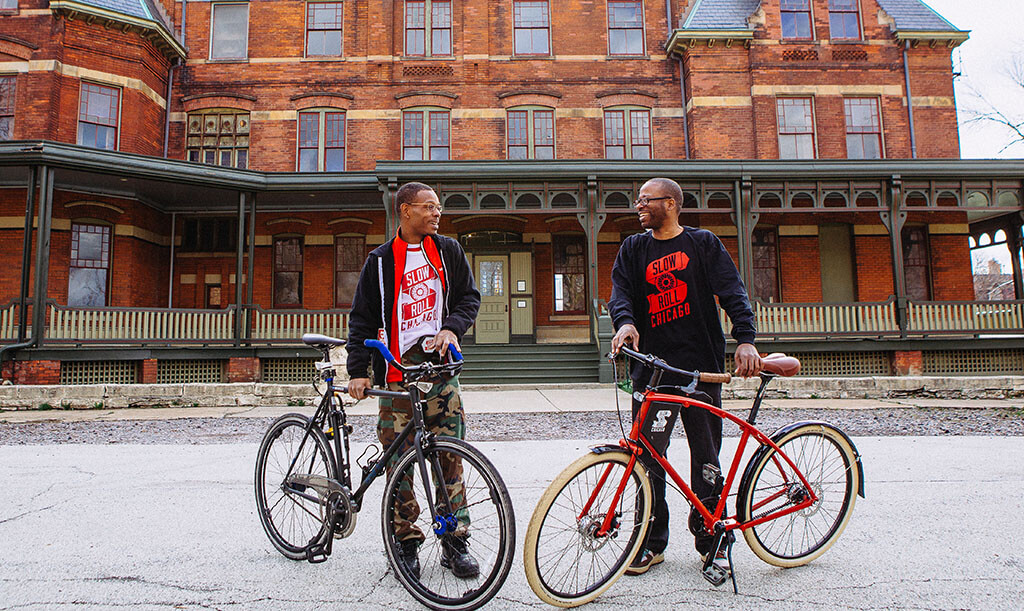
Julien and Reed. Photo by Lisa Beth Anderson
In the months following Reed’s first ride on the lakefront, he adopted bicycling as a crucial part of his healing process. Loading his bike into the trunk of his car and taking it down to the lakefront to ride become a way to clear his head. As time progressed, he felt the desire to make the experience more social. He would invite friends and family to come along, but there was always some excuse. No bike, no time, or “that’s not really my thing.”
Reed soon founded The Pioneers Bicycle Club, a social bike club that he later folded into his friend Eboni Senai Hawkin’s Chicago chapter of Red, Bike, and Green (RBG). Reed recognized that both groups shared the same vision of encouraging more black people to ride bikes. He was co-organizing RBG with Hawkins in 2014 when he and Julien caught wind of a new event called Slow Roll Detroit.
Founded in 2010, Slow Roll Detroit aims to challenge negative perceptions of the city and foster economic revitalization through social bike rides that connect residents to their communities. In just five years, Slow Roll Detroit has grown to a weekly ride and over 4,500 people participating during the 2014 season. Now the movement has spread globally – with more than 13 chapters worldwide – from Buffalo to Berlin.
Watching videos and reading everything they could about Slow Roll Detroit, Reed and Julien were excited about the possibility of something similar taking place in their hometown. “We loved it,” said Reed. “We were just enthralled with what we were seeing and we wanted to bring that same energy and spirit to Chicago.”
Reed and Julien reached out to Slow Roll Detroit founders, Jason Hall and Mike MacKool, to enquire about starting a chapter in Chicago. While they were initially met with a little hesitation, a fortuitous encounter with Hall at a marketing event in Chicago set the gears in motion. “We go, we meet him, we connect with him, and literally two days later we get the green light to start the chapter in Chicago,” recalled Reed. “We launched it within, I believe, two weeks after we got the yes.” Their first ride kicked off in November 2014 and the momentum has been growing exponentially ever since.
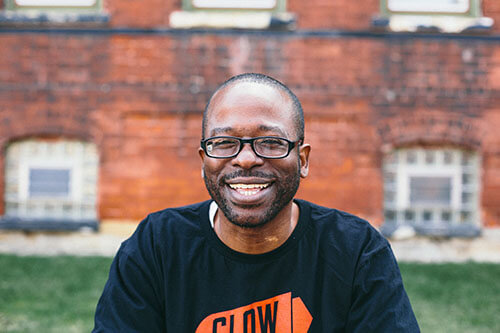
Oboi Reed. Photo by Lisa Beth Anderson
Reed and Julien recognized how Slow Roll could address many socioeconomic issues that many Chicagoans face and made it their mission to use the rides to connect communities. The rides go through the South and West Sides – neighborhoods that mainstream media often depict as hopeless and unsafe.
“We are a very, very segregated population in Chicago,” said Julien. “So it has an impact on the way that people live and the way that they perceive other individuals. There’s a narrative out there that says that if you live on the South Side or the West Side of Chicago, then you’re probably a bad person or someone that I should fear. And it’s just a false narrative that misrepresents the reality of these neighborhoods.”
This false narrative has a direct, negative impact on the residents within those communities. Housing values are lower, access to capital is nearly non-existent, and access to fresh food is scarce because both investors and retailers refuse to invest in an area where there’s an assumption of crime and violence. The result is large communities of people who have disproportionately low access to resources because of erroneous assumptions perpetuated by the media.
Reed and Julien believe that by changing the narrative, they can reverse this cycle and bring a renewed sense of vitality to these communities. “The way we believe we can change the narrative is by getting people outside of their door who live in the neighborhood, and experiencing the neighborhood in a whole new way,” said Reed. “And also getting people who don’t live in the neighborhood to come and see the beauty on the South Side and West Side, the beautiful people, the beautiful organizations, the beautiful shops, the beautiful architecture.”
In an effort to foster local development, Slow Roll Chicago always kicks off at a different business in the community – such as a café or restaurant – and partners with a local community organization for each ride. “It’s so that people in the neighborhood feel like it’s their ride, not our ride,” explained Reed. “Not just some people showing up … they feel a sense of ownership in the experience because this came as a result of their work.”
The concept appears to be working. Both Reed and Julien describe the community reactions to the rides as the reception you might expect for a parade. People come out on their porches to wave and shout, business owners leave their shops to clap, and drivers honk their horns in support as the group rides by. A man from the North Side who joined one of their first rides recently took Julien aside and told him that, previous to the ride, he would never have gotten off the expressway on the South Side. “After riding through the neighborhood, he said ‘I’m ashamed of that,’” said Julien. “I mean, I almost wanted to give the guy a hug or something.”
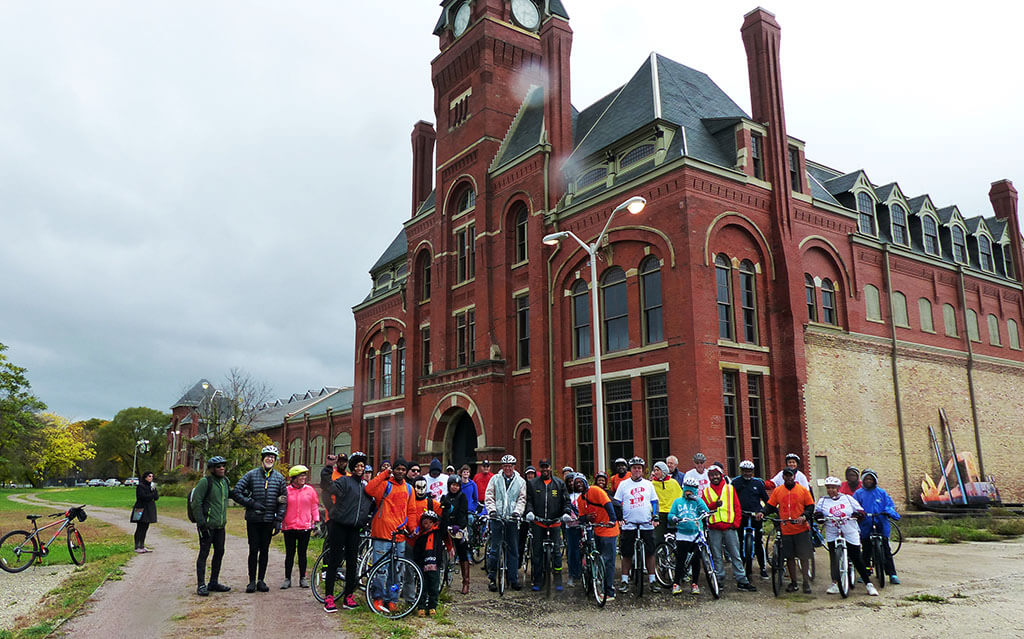
At the Pullman State Historic Site during Celebrating History, Creating Community: An Interactive Bicycle Tour of the Historic Pullman & Greater Roseland Neighborhoods. Photo by Liz Espoz.
In a deeply segregated city where the figurative borders between communities can often seem impassable, a diverse group of 100-200 people riding their bikes together through the South and West Sides is an optimistic sight indeed.
“That’s one of the things that I’m probably the most proud of with respect to the community, and I do view Slow Roll Chicago as a community,” said Julien. “It’s the diversity. With respect to the various races and socioeconomics … it seems to me to be everybody and it’s just awesome.”
Now only in its second official season, Slow Roll Chicago is gaining recognition at municipal and state levels as well. At a state event that Reed and Julien casually dropped in on last year, Governor Pat Quinn’s Chief of Staff heard what they were doing and brought Quinn from the stage directly over to speak to Reed and Julien – with Chicago Mayor Rahm Emanuel and a trail of reporters following closely behind. “That stuff’s not supposed to happen,” laughed Julien. “Slow Roll baby!”
Moving beyond their own organic approach to encouraging community development, Reed and Julien are also using their unique positions to advocate for better bike infrastructure on the South and West Sides. While the city’s current approach is to build more bike lanes in areas where more people ride, the pair believe the opposite approach is necessary for a meaningful attempt at tackling inequality in the city.
“You recognize the inherent value of stronger bike communities and the contribution of a stronger bike culture in reducing violence, improving people’s health, creating jobs,” explained Reed. “All of those benefits are more needed on the South and West Sides than they are in predominantly white, predominantly middle-upper income neighborhoods. And because they’re more needed in these low-moderate income communities of color, then the city and the state should invest more to make those neighborhoods more bikeable than they do in predominantly white, predominantly middle-upper income neighborhoods. That is what we call equity.”
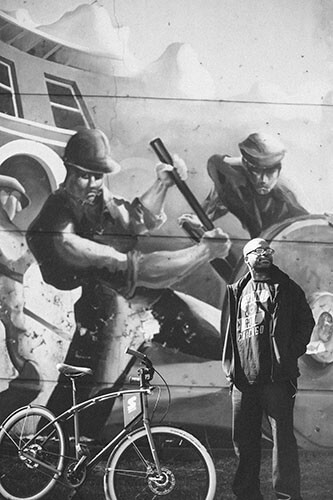
Oboi Reed. Photo by Lisa Beth Anderson
For the 2015 season, which runs weekly from April to October, Reed and Julien want to focus on getting more young people involved. While they get a lot of enthusiasm from adults and kids accompanied by their parents or grandparents, they’ve hit a few hurdles trying to appeal to 13- to 25-year-olds. By encouraging young people to bike more and advocating for bike equity at the municipal level, Reed and Julien are pushing toward a vision of Chicago where vibrant, healthy communities can develop organically on livable streets.
“There are so many unbelievable things that happen when you have a community that’s bikeable and walkable,” said Julien. “I want it to be the same Chicago I grew up in where I could meet somebody like Oboi and we could know each other for 30 years because we walked from our homes to the local school or we biked to the park. We had bikeable, walkable communities, and Oboi is just one of a bunch of relationships that I’ve had for over thirty years because we grew up together in a community.”
slowrollchicago.org @SlowRollChicago
Hilary Angus is the online editor at Momentum Mag and an occasional freelance writer. She is interested in sustainability, human geography, and the social lives of cities. @HilaryAngus
Lisa Beth Anderson is the founder of In Good Company, an Oakland-based photography company that works with socially conscious entrepreneurs and nonprofits to create photographic narratives that communicate passion, mission, and impact. ingoodcompany.photography | @we_are_in_good
Find inspiration in our Gear Guide that will keep you out on your bike through wind or rain.
Download Now
This is how cycling SHOULD be…and sadly all too often feels like it isn’t.
Bravo!
Interesting and inspirational. I’m going to look up their organization right now. Thank you!
Lovely story. Thank you!
Comments are closed.